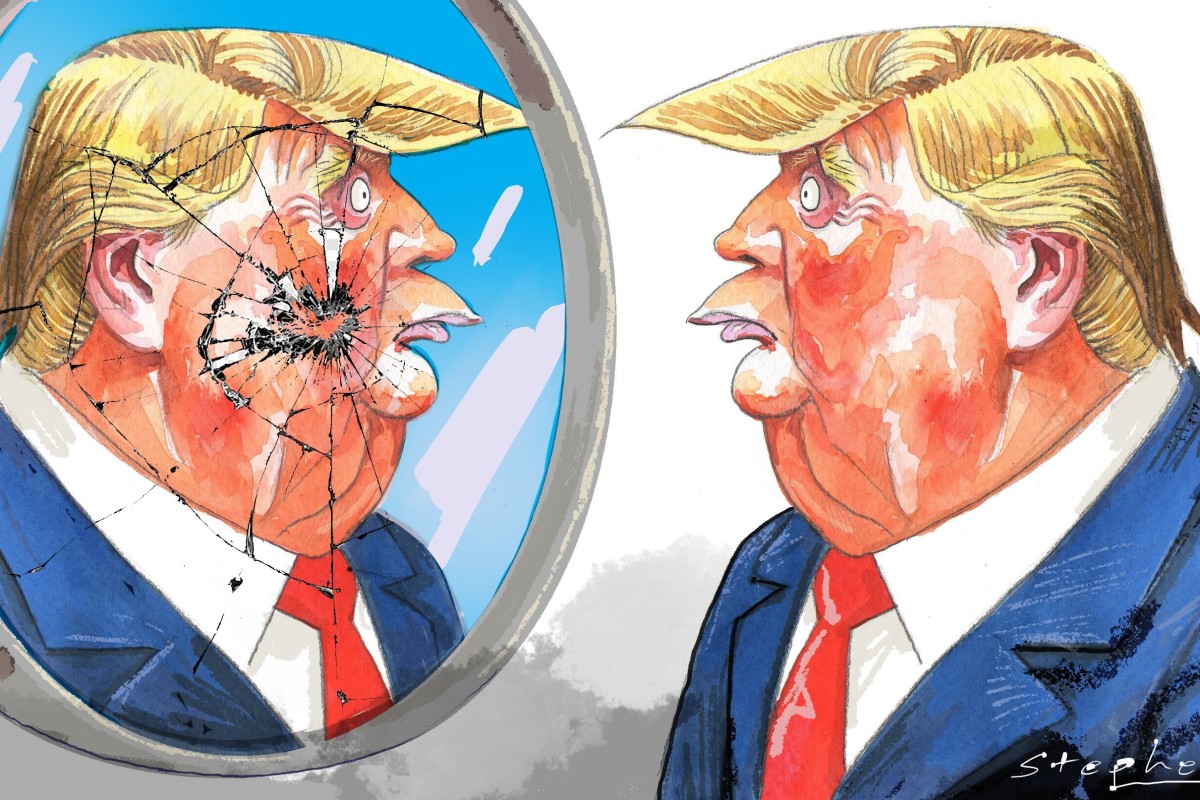The popular notion that narcissists are endowed with an extraordinary reservoir of confidence, self-importance and unconditional self-regard is mistaken
Narcissists like Trump try to mask their shortcomings and constantly attack others to protect their own fragile egos from being exposed and collapsing
Bertie Wai Published: 3 Oct, 2020

Illustration: Craig Stephens
The fiery US presidential debate between President Donald Trump and Joe Biden set the internet ablaze with criticism. The debate was described as chaotic, messy and a national embarrassment. CNN’s Jake Tapper summed up the debate in a colourful analogy: “That was a hot mess inside a dumpster fire inside a train wreck.”
Negative reviews rained on Trump’s self-congratulating parade, criticising him as a bully for bulldozing Biden and steamrollering Chris Wallace, the moderator of the debate. The 90-plus-minute barrage of personal attacks, insults, interruptions and incoherence was often credited to Trump’s lack of integrity, intelligence and decorum.
Mary Trump, a clinical psychologist and Donald Trump’s niece, wrote the book
Too Much and Never Enough which gave an insider’s view of how family influences helped shape Donald Trump. She said her uncle’s “debate performance was a grotesque combination of lies, racism, breathtaking callousness, and threats against our democracy”.
One of the labels mental health professionals often ascribe to Donald Trump is narcissism. In fact, the extensive broadcast of Trump’s ruthless thoughts and reckless behaviour has raised such alarm that many psychiatrists and mental health professionals in the United States are warning about the dangers of Trump’s narcissistic personality disorder (NPD).
This is exceptional because it flies in the face of the American Psychiatric Association’s (APA)
Goldwater Rule, which prohibits psychiatrists from diagnosing or commenting on the mental health of public figures without examination and consent.
There is an ongoing debate in the psychiatric community whether the Goldwater Rule should still be observed at an unusual time like this, when the unprecedented hazards that a commander-in-chief’s detrimental mental health condition can pose to national welfare and public safety are no longer contained within a reality TV show.
What is a narcissist? A common understanding is someone who is grandiose, entitled and lacks empathy. These descriptions fit what we often see on TV, where Trump never gets tired of reiterating he is the best, greatest and most presidential-est and is often portrayed as caring for no one but himself. Trump’s own sister Maryanne Trump Barry is known to have said, “Donald‘s out for Donald. Period.”
One might see a narcissist as someone who is endowed with an
extraordinary reservoir of confidence, self-importance and unconditional self-regard.
One could imagine a narcissist as basking in the blessed haven of an inflated ego under the eternal sunshine of gratifying thoughts about one’s greatness. Snow White’s evil queen comes to mind: “Mirror, mirror, on the wall, of course I am the prettiest of all!”
Those who work with NPD in a clinical setting are familiar with a psychological reality that is in stark contrast to the common myth. The psychological structure responsible for NPD is actually a very fragile ego. Because it is too painful to get in touch with such fragility, the narcissist goes to extreme lengths to banish any inkling of their own imperfections.
Mary Trump had this to say about her uncle: “Donald’s ego has been and is a fragile and inadequate barrier between him and the real world, which, thanks to his father’s money and power, he never had to negotiate by himself.
“Donald has always needed to perpetuate the fiction my grandfather started that he is strong, smart and otherwise extraordinary, because facing the truth – that he is none of those things – is too terrifying for him to contemplate.”
If it is too terrifying to contemplate one’s lack’s of extraordinary qualities, why can’t one just decide to not face it? Problem solved, right? Not so fast. Our psychology operates on different levels.
Even though we might be somewhat successful at times at shutting out an
inconvenient aspect of reality, we are still aware of it on a deeper level. This is one of the reasons material we don’t want to deal with in waking life shows up in our dreams in disguised forms.
The mirror that reveals Snow White as the prettiest of all is mirroring back a view the evil queen is too terrified to contemplate: she is not, in fact, the prettiest of all. Mary Trump had something similar to say of Donald Trump, who “began to believe his own hype, even as he paradoxically suspected on a very deep level that nobody else did”.
This is the plague of narcissism. Narcissists are persecuted by a fragile, impoverished ego; the only recourse to avoid the painful realisation of their fragility is to continuously inflate the ego as a countermeasure to keep their fragile ego from collapsing.
When the mirror on the wall sends back a view that challenges the evil queen’s inflated sense of her prettiness, she responds with a murderous rage. This is not an uncommon response from a narcissist – any threat to their sense of superiority will be
met with rage.
Mary Trump observed that, “Donald met any challenges to his sense of superiority with anger, his fear and vulnerabilities so effectively buried that he didn’t even have to acknowledge they existed.”
Trump wants no rule changes after chaotic debate, declares himself winner
2 Oct 2020

It sounds like a tragedy that, “there would be no love for Donald at all, just his agonising thirsting for it. The rage, left to grow, would come to overshadow everything else”.
Donald Trump’s rage whenever challenged is as predictable as 1+1=2. The president said so himself on Twitter: “When someone attacks me, I always attack back...except 100x more. This has nothing to do with a tirade but rather, a way of life!”
The psychological reality a narcissist has to contend with is very far from a blessed haven of warm and fuzzy feelings for oneself. It is a psychological warfare that has no place for peace because one has to keep up the attacks on others to protect one’s fragile ego from being exposed and collapsing.

Dr Bertie Wai is a bilingual clinical psychologist at Beautiful Mind Therapy and Family Services in Central. She provides therapy to children, teens, adults and couples, as well as parenting consultation.
No comments:
Post a Comment